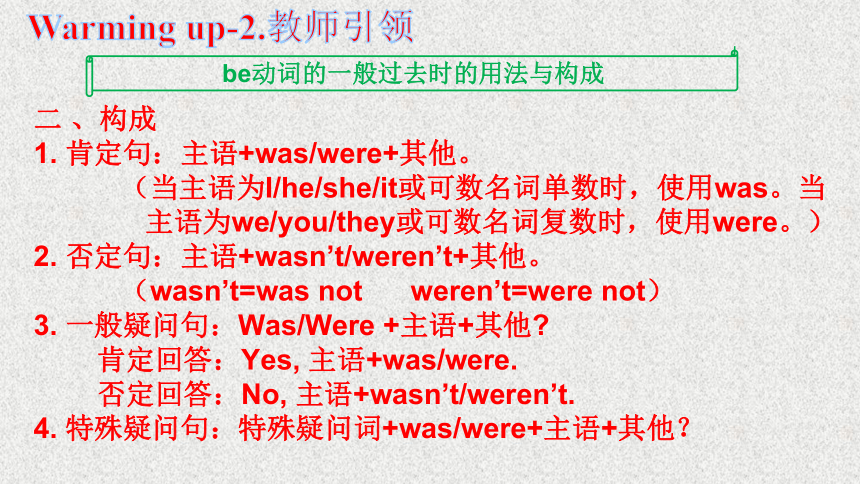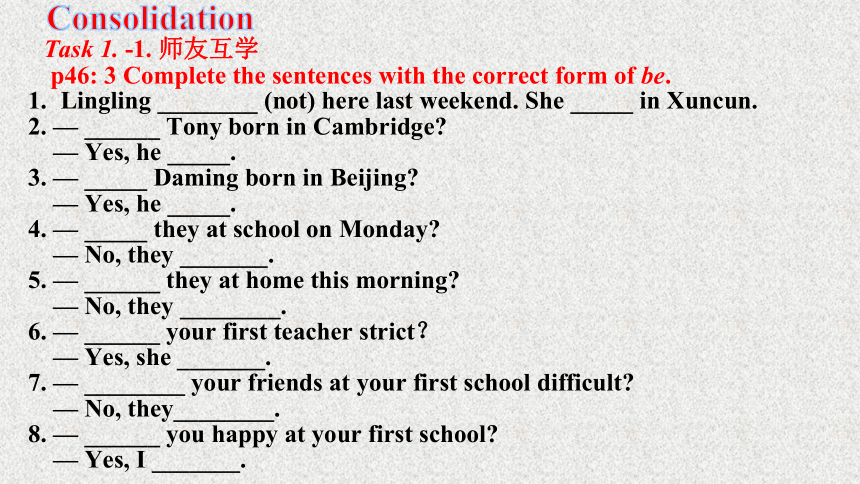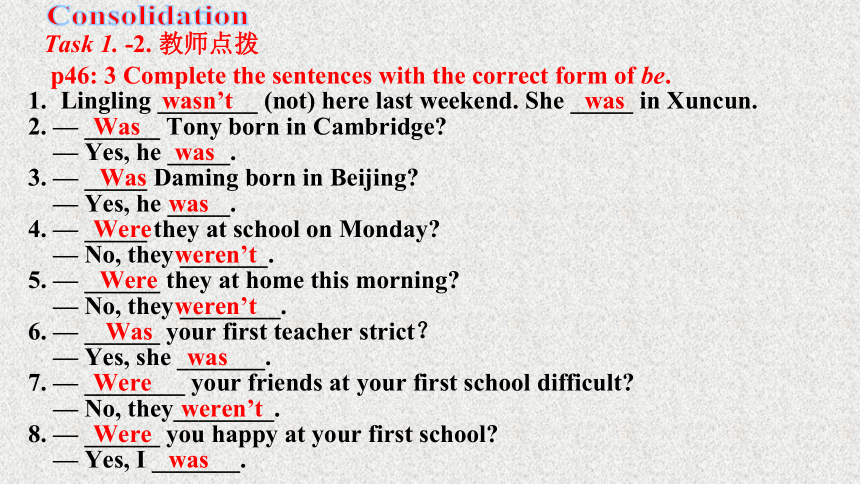Module7Unit3课件2021-2022学年山东省阳谷县教育和体育局外研版七年级下册英语(18张PPT)
文档属性
| 名称 | Module7Unit3课件2021-2022学年山东省阳谷县教育和体育局外研版七年级下册英语(18张PPT) |  | |
| 格式 | zip | ||
| 文件大小 | 252.6KB | ||
| 资源类型 | 教案 | ||
| 版本资源 | 外研版 | ||
| 科目 | 英语 | ||
| 更新时间 | 2022-01-30 09:42:45 | ||
图片预览







文档简介
(共18张PPT)
Module 7 My past life
Unit 3 Language in use
(Grammar)
Warming up-1.师友朗读
1. I was born in Quincy.
2. My first teacher was Mrs Lane.
3. I wasn’t bored in Qunicy.
4. Were you difficult in class too
No, I wasn’t.
5. Where were you born
Read and pay attention to the red words.
一 、用法
表示过去某个时间点或某时间段内发生的动作或存在的状态,一般要和表示过去的时间状语连用。eg. just now,yesterday,
the day before yesterday, last..., in +时间点, …ago, once upon a time等。
be动词的一般过去时的用法与构成
Warming up-2.教师引领
二 、构成
1. 肯定句:主语+was/were+其他。
(当主语为I/he/she/it或可数名词单数时,使用was。当
主语为we/you/they或可数名词复数时,使用were。)
2. 否定句:主语+wasn’t/weren’t+其他。
(wasn’t=was not weren’t=were not)
3. 一般疑问句:Was/Were +主语+其他
肯定回答:Yes, 主语+was/were.
否定回答:No, 主语+wasn’t/weren’t.
4. 特殊疑问句:特殊疑问词+was/were+主语+其他?
be动词的一般过去时的用法与构成
Warming up-2.教师引领
注意: there be (有)的一般过去时的构成
肯定句:There was/were...
否定句:There wasn’t/weren’t...
一般疑问句:Was/Were there...
肯定回答:Yes, there was/were.
否定回答:No, there wasn’t /weren’t.
(was/were的选择根据就近原则,即与离它最近的那个名词的数保持一致.)
be动词的一般过去时的用法与构成
Warming up-2.教师引领
p46: 3 Complete the sentences with the correct form of be.
Consolidation
Task 1. -1. 师友互学
Lingling ________ (not) here last weekend. She _____ in Xuncun.
2. — ______ Tony born in Cambridge
— Yes, he _____.
3. — _____ Daming born in Beijing
— Yes, he _____.
4. — _____ they at school on Monday
— No, they _______.
5. — ______ they at home this morning
— No, they ________.
6. — ______ your first teacher strict?
— Yes, she _______.
7. — ________ your friends at your first school difficult
— No, they________.
8. — ______ you happy at your first school
— Yes, I _______.
Consolidation
Task 1. -2. 教师点拨
p46: 3 Complete the sentences with the correct form of be.
Lingling ________ (not) here last weekend. She _____ in Xuncun.
2. — ______ Tony born in Cambridge
— Yes, he _____.
3. — _____ Daming born in Beijing
— Yes, he _____.
4. — _____ they at school on Monday
— No, they _______.
5. — ______ they at home this morning
— No, they ________.
6. — ______ your first teacher strict?
— Yes, she _______.
7. — ________ your friends at your first school difficult
— No, they________.
8. — ______ you happy at your first school
— Yes, I _______.
wasn’t was
Was
was
Was
was
Were
weren’t
Were
weren’t
Was
was
Were
weren’t
Were
was
p47: 4 Complete the sentences with the correct form of the word and expressions from the box.
Consolidation
Task 2. -1. 师友互学
be bored be born lots of on the east coast of primary school town
I was a good pupil in _______________.
2. — Where ______ you _______
— In Newton, a small _______ in America.
3. — Can I play a computer game, Mum I _________.
— You can read your book.
4. Qingdao is in Shandong Province and it is ________________ China.
5. There was a new film on yesterday and there were _______ people at the cinema.
Consolidation
Task 2. -2. 教师点拨
p47: 4 Complete the sentences with the correct form of the word and expressions from the box.
be bored be born lots of on the east coast of primary school town
I was a good pupil in _______________.
2. — Where ______ you _______
— In Newton, a small _______ in America.
3. — Can I play a computer game, Mum I _________.
— You can read your book.
4. Qingdao is in Shandong Province and it is ________________ China.
5. There was a new film on yesterday and there were _______ people at the cinema.
primary school
were born
town
am bored
on the east coast of
lots of
Task 1 Around the world
Extension
Nelson Mandela was born in a small village in the Transkei region of South Africa. He was born on 18th July, 1918. He was President of South Africa from 1994 to 1999.
Hero of South Africa
用所给be动词的适当形式完成句子。
1. Where ____ Mei Fang last night
2. He ____ here five minutes ago.
3. It ____ Sunday yesterday. My parents
and I ____ in the park.
4. They ____ in Japan yesterday.
5. When I ____ a child, I often listened to music.
6. My father ____ at work yesterday morning.
7. We _____ students two years ago.
9. The mobile phone _____ on the sofa yesterday evening.
Extension
Task 2. -1. 师友互学
用所给be动词的适当形式完成句子。
1. Where ____ Mei Fang last night
2. He ____ here five minutes ago.
3. It ____ Sunday yesterday. My parents and I ____ in the park.
4. They ____ in Japan yesterday.
5. When I ____ a child, I often listened to music.
6. My father ____ at work yesterday morning.
7. We _____ students two years ago.
9. The mobile phone _____ on the sofa yesterday evening.
was
was
was were
were
was
was
were
was
Task 2. -2. 教师点拨
Extension
1. There was a big house near the river. (改为一般疑问句并作肯定回答)
2. There were lots of people in the concert. (改为否定句)
3. I was born in Shandong. (对画线部分提问)
4. I was born in Shandong. (一般疑问句)
_______________ in Shandong
5. There is a pond near my house. (用last year改写)
_______________ a pond near my house last year.
6. There was much money in the bag. (改为否定句)
______________ much money in the bag.
7. We were in Dalian in 2003. (对划线提问)
______________ in Dalian
8. The girl was born in a small village. (划线提问)
______________ the girl ______________
根据要求改写句子。
Task 3. -1. 师友互学
Extension
Task 3. -2. 教师点拨
Extension
1. There was a big house near the river. (改为一般疑问句并作肯定回答)
2. There were lots of people in the concert. (改为否定句)
3. I was born in Shandong. (对画线部分提问)
4. I was born in Shandong. (一般疑问句)
_______________ in Shandong
5. There is a pond near my house. (用last year改写)
_______________ a pond near my house last year.
6. There was much money in the bag. (改为否定句)
______________ much money in the bag.
7. We were in Dalian in 2003. (对划线提问)
______________ in Dalian
8. The girl was born in a small village. (划线提问)
______________ the girl ______________
根据要求改写句子。
Was there a big house near the river Yes, there was.
There weren’t lots of people in the concert.
Where were you born
Were you born
There was
There wasn’t
When were you
Where was born
Summarize-1.师友梳理
一 、用法
表示过去某个时间点或某时间段内发生的动作或存在的状态,一般要和表示过去的时间状语连用。eg. just now,yesterday,
the day before yesterday, last..., in +时间点, …ago, once upon a time等。
be动词的一般过去时的用法与构成
Summarize-2.教师总结
二 、构成
1. 肯定句:主语+was/were+其他。
(当主语为I/he/she/it或可数名词单数时,使用was。当
主语为we/you/they或可数名词复数时,使用were。)
2. 否定句:主语+wasn’t/weren’t+其他。
(wasn’t=was not weren’t=were not)
3. 一般疑问句:Was/Were +主语+其他
肯定回答:Yes, 主语+was/were.
否定回答:No, 主语+wasn’t/weren’t.
4. 特殊疑问句:特殊疑问词+was/were+主语+其他?
be动词的一般过去时的用法与构成
Summarize-2.教师总结
注意: there be (有)的一般过去时的构成
肯定句:There was/were...
否定句:There wasn’t/weren’t...
一般疑问句:Was/Were there...
肯定回答:Yes, there was/were.
否定回答:No, there wasn’t /weren’t.
(was/were的选择根据就近原则,即与离它最近的那个名词的数保持一致.)
be动词的一般过去时的用法与构成
读、记八模块一单元的单词。
Homework
Module 7 My past life
Unit 3 Language in use
(Grammar)
Warming up-1.师友朗读
1. I was born in Quincy.
2. My first teacher was Mrs Lane.
3. I wasn’t bored in Qunicy.
4. Were you difficult in class too
No, I wasn’t.
5. Where were you born
Read and pay attention to the red words.
一 、用法
表示过去某个时间点或某时间段内发生的动作或存在的状态,一般要和表示过去的时间状语连用。eg. just now,yesterday,
the day before yesterday, last..., in +时间点, …ago, once upon a time等。
be动词的一般过去时的用法与构成
Warming up-2.教师引领
二 、构成
1. 肯定句:主语+was/were+其他。
(当主语为I/he/she/it或可数名词单数时,使用was。当
主语为we/you/they或可数名词复数时,使用were。)
2. 否定句:主语+wasn’t/weren’t+其他。
(wasn’t=was not weren’t=were not)
3. 一般疑问句:Was/Were +主语+其他
肯定回答:Yes, 主语+was/were.
否定回答:No, 主语+wasn’t/weren’t.
4. 特殊疑问句:特殊疑问词+was/were+主语+其他?
be动词的一般过去时的用法与构成
Warming up-2.教师引领
注意: there be (有)的一般过去时的构成
肯定句:There was/were...
否定句:There wasn’t/weren’t...
一般疑问句:Was/Were there...
肯定回答:Yes, there was/were.
否定回答:No, there wasn’t /weren’t.
(was/were的选择根据就近原则,即与离它最近的那个名词的数保持一致.)
be动词的一般过去时的用法与构成
Warming up-2.教师引领
p46: 3 Complete the sentences with the correct form of be.
Consolidation
Task 1. -1. 师友互学
Lingling ________ (not) here last weekend. She _____ in Xuncun.
2. — ______ Tony born in Cambridge
— Yes, he _____.
3. — _____ Daming born in Beijing
— Yes, he _____.
4. — _____ they at school on Monday
— No, they _______.
5. — ______ they at home this morning
— No, they ________.
6. — ______ your first teacher strict?
— Yes, she _______.
7. — ________ your friends at your first school difficult
— No, they________.
8. — ______ you happy at your first school
— Yes, I _______.
Consolidation
Task 1. -2. 教师点拨
p46: 3 Complete the sentences with the correct form of be.
Lingling ________ (not) here last weekend. She _____ in Xuncun.
2. — ______ Tony born in Cambridge
— Yes, he _____.
3. — _____ Daming born in Beijing
— Yes, he _____.
4. — _____ they at school on Monday
— No, they _______.
5. — ______ they at home this morning
— No, they ________.
6. — ______ your first teacher strict?
— Yes, she _______.
7. — ________ your friends at your first school difficult
— No, they________.
8. — ______ you happy at your first school
— Yes, I _______.
wasn’t was
Was
was
Was
was
Were
weren’t
Were
weren’t
Was
was
Were
weren’t
Were
was
p47: 4 Complete the sentences with the correct form of the word and expressions from the box.
Consolidation
Task 2. -1. 师友互学
be bored be born lots of on the east coast of primary school town
I was a good pupil in _______________.
2. — Where ______ you _______
— In Newton, a small _______ in America.
3. — Can I play a computer game, Mum I _________.
— You can read your book.
4. Qingdao is in Shandong Province and it is ________________ China.
5. There was a new film on yesterday and there were _______ people at the cinema.
Consolidation
Task 2. -2. 教师点拨
p47: 4 Complete the sentences with the correct form of the word and expressions from the box.
be bored be born lots of on the east coast of primary school town
I was a good pupil in _______________.
2. — Where ______ you _______
— In Newton, a small _______ in America.
3. — Can I play a computer game, Mum I _________.
— You can read your book.
4. Qingdao is in Shandong Province and it is ________________ China.
5. There was a new film on yesterday and there were _______ people at the cinema.
primary school
were born
town
am bored
on the east coast of
lots of
Task 1 Around the world
Extension
Nelson Mandela was born in a small village in the Transkei region of South Africa. He was born on 18th July, 1918. He was President of South Africa from 1994 to 1999.
Hero of South Africa
用所给be动词的适当形式完成句子。
1. Where ____ Mei Fang last night
2. He ____ here five minutes ago.
3. It ____ Sunday yesterday. My parents
and I ____ in the park.
4. They ____ in Japan yesterday.
5. When I ____ a child, I often listened to music.
6. My father ____ at work yesterday morning.
7. We _____ students two years ago.
9. The mobile phone _____ on the sofa yesterday evening.
Extension
Task 2. -1. 师友互学
用所给be动词的适当形式完成句子。
1. Where ____ Mei Fang last night
2. He ____ here five minutes ago.
3. It ____ Sunday yesterday. My parents and I ____ in the park.
4. They ____ in Japan yesterday.
5. When I ____ a child, I often listened to music.
6. My father ____ at work yesterday morning.
7. We _____ students two years ago.
9. The mobile phone _____ on the sofa yesterday evening.
was
was
was were
were
was
was
were
was
Task 2. -2. 教师点拨
Extension
1. There was a big house near the river. (改为一般疑问句并作肯定回答)
2. There were lots of people in the concert. (改为否定句)
3. I was born in Shandong. (对画线部分提问)
4. I was born in Shandong. (一般疑问句)
_______________ in Shandong
5. There is a pond near my house. (用last year改写)
_______________ a pond near my house last year.
6. There was much money in the bag. (改为否定句)
______________ much money in the bag.
7. We were in Dalian in 2003. (对划线提问)
______________ in Dalian
8. The girl was born in a small village. (划线提问)
______________ the girl ______________
根据要求改写句子。
Task 3. -1. 师友互学
Extension
Task 3. -2. 教师点拨
Extension
1. There was a big house near the river. (改为一般疑问句并作肯定回答)
2. There were lots of people in the concert. (改为否定句)
3. I was born in Shandong. (对画线部分提问)
4. I was born in Shandong. (一般疑问句)
_______________ in Shandong
5. There is a pond near my house. (用last year改写)
_______________ a pond near my house last year.
6. There was much money in the bag. (改为否定句)
______________ much money in the bag.
7. We were in Dalian in 2003. (对划线提问)
______________ in Dalian
8. The girl was born in a small village. (划线提问)
______________ the girl ______________
根据要求改写句子。
Was there a big house near the river Yes, there was.
There weren’t lots of people in the concert.
Where were you born
Were you born
There was
There wasn’t
When were you
Where was born
Summarize-1.师友梳理
一 、用法
表示过去某个时间点或某时间段内发生的动作或存在的状态,一般要和表示过去的时间状语连用。eg. just now,yesterday,
the day before yesterday, last..., in +时间点, …ago, once upon a time等。
be动词的一般过去时的用法与构成
Summarize-2.教师总结
二 、构成
1. 肯定句:主语+was/were+其他。
(当主语为I/he/she/it或可数名词单数时,使用was。当
主语为we/you/they或可数名词复数时,使用were。)
2. 否定句:主语+wasn’t/weren’t+其他。
(wasn’t=was not weren’t=were not)
3. 一般疑问句:Was/Were +主语+其他
肯定回答:Yes, 主语+was/were.
否定回答:No, 主语+wasn’t/weren’t.
4. 特殊疑问句:特殊疑问词+was/were+主语+其他?
be动词的一般过去时的用法与构成
Summarize-2.教师总结
注意: there be (有)的一般过去时的构成
肯定句:There was/were...
否定句:There wasn’t/weren’t...
一般疑问句:Was/Were there...
肯定回答:Yes, there was/were.
否定回答:No, there wasn’t /weren’t.
(was/were的选择根据就近原则,即与离它最近的那个名词的数保持一致.)
be动词的一般过去时的用法与构成
读、记八模块一单元的单词。
Homework
同课章节目录
- Module 1 Lost and found
- Unit 1 Whose bag is this?
- Unit 2 Are they yours?
- Unit 3 Language in use
- Module 2 What can you do ?
- Unit 1 I can play the piano
- Unit 2 I can run really fast
- Unit 3 Language in use
- Module 3 Making plans
- Unit 1 What are you going to do at the weekends?
- Unit 2 We're going to cheer the players.
- Unit 3 Language in use
- Module 4 Life in the future
- Unit 1 Everyone will study at home
- Unit 2 Every family will have a small plane.
- Unit 3 Language in use
- Module 5 Shopping
- Unit 1 What can I do for you?
- Unit 2 You can buy everything on the Internet
- Unit 3 Language in use
- Module 6 Around town
- Unit 1 Could you tell me how to get to the Nationa
- Unit 2 The London Eye is on your right.
- Unit 3 Language in use
- Revision module A
- Module 7 My past life
- Unit 1 I was born in a small village.
- Unit 2 I was born in Quincy.
- Unit 3 Language in use
- Module 8 Story time
- Unit 1 Once upon a time….
- Unit 2 Goldilocks hurried out of the house.
- Unit 3 Language in use
- Module 9 Life history
- Unit 1 He left school and began work at the age of
- Unit 2 He decided to be an actor.
- Unit 3 Language in use
- Module 10 A holiday journey
- Unit 1 What did you do?
- Unit 2 This morning we took a walk.
- Unit 3 Language in use
- Module 11 Body language
- Unit 1 They touch noses!
- Unit 2 Here are some ways to welcome them.
- Unit 3 Language in use
- Module 12 Western music
- Unit 1 It's so beautiful!
- Unit 2 Vienna is the centre of European classical
- Unit 3 Language in use
- Revision module B
